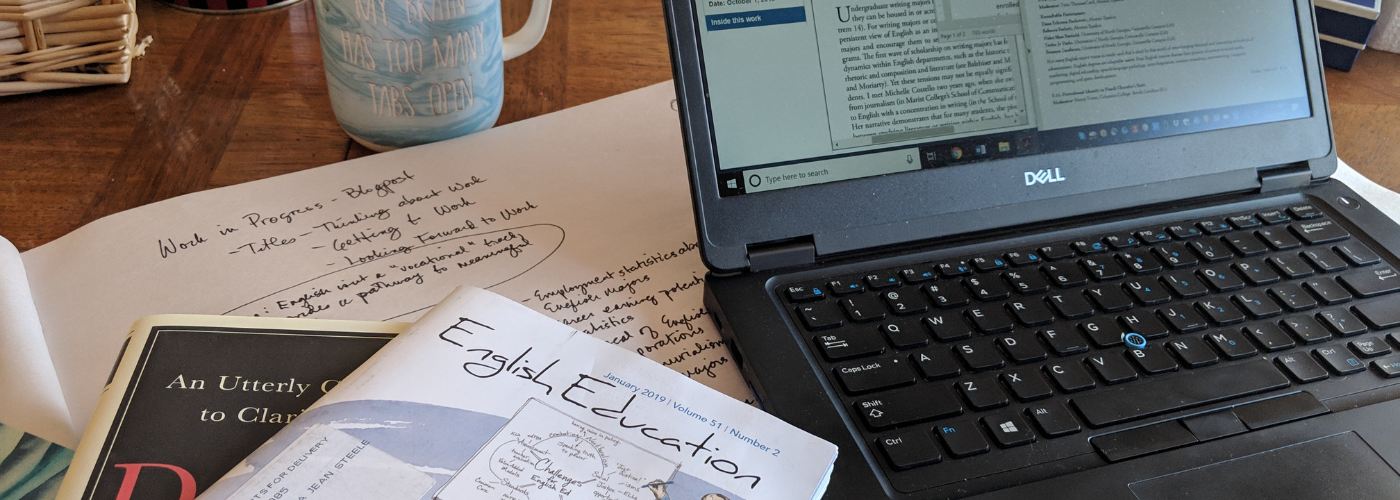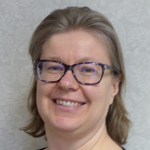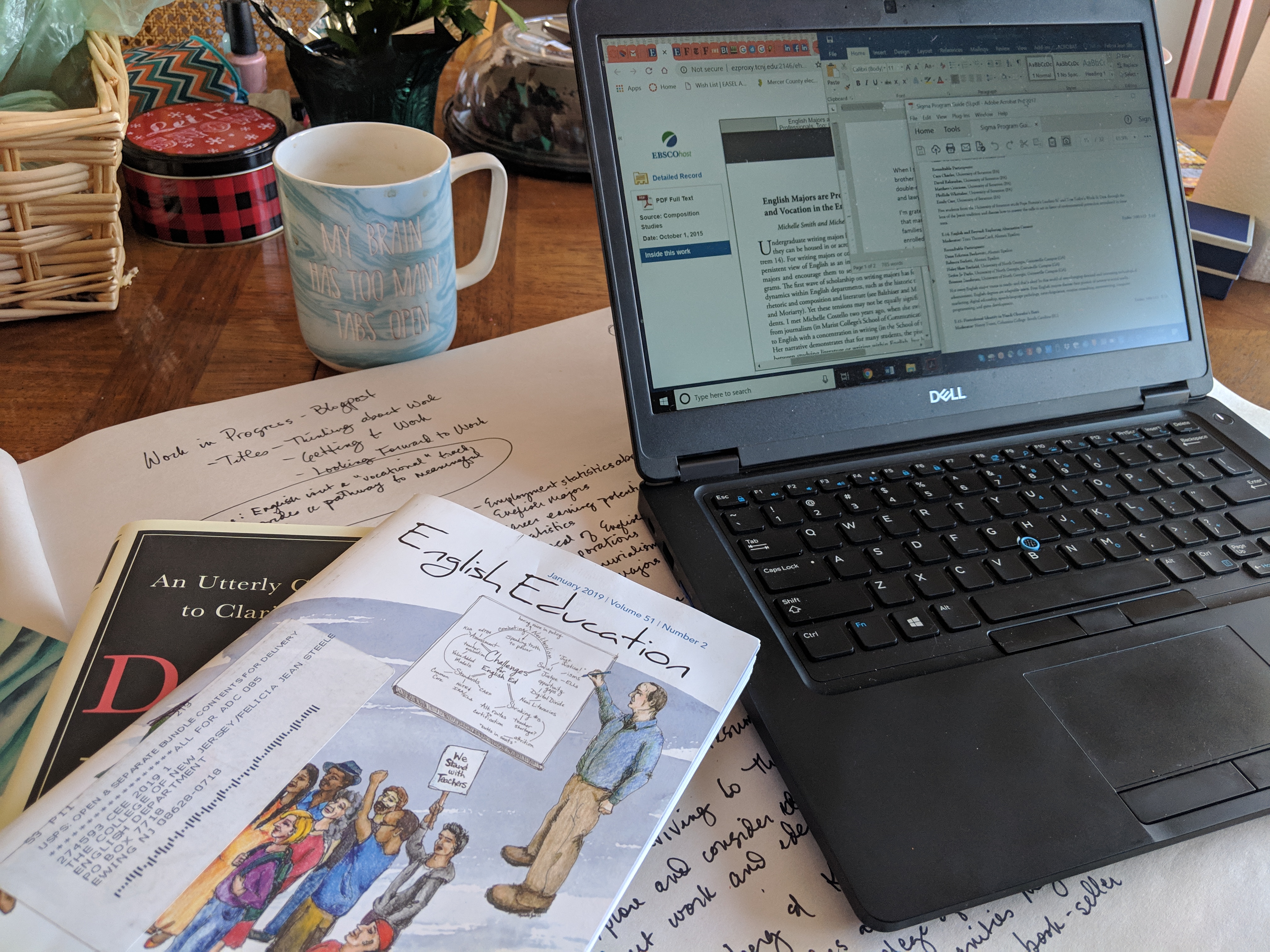
When I started college, back in the last century, I was only the second person in my family to attend. My brother had started an engineering degree, but didn’t finish it. I began college as an English/Philosophy double-major because a family friend told me that was the best preparation that a lawyer could have, and lawyers were the only kind of professionals I knew. And that is the only thing that I knew I wanted to be—a professional. Like many other first generation, working-class students, I had no idea what the path would be that would get me to that destination.
I’m grateful that no one in my family ever asked “why do you want to be an English major?” But I know that many of my students get those questions (and the negative feedback that they suggest) from families and friends every day. If families and friends were more supportive, the number of students enrolled in English would likely not have been in a steady decline since 1993. Students and their families today also feel greater financial pressures than those of previous generations. Collectively, Americans owe $1.5 Trillion in student debt. With this weight on our collective psyche, it is no wonder we all worry about the future job prospects of English majors. For students from less privileged backgrounds, the worry can be overwhelming and discouraging.
Since English is not a “vocational” college track, like pharmacy or engineering, English majors must invest more time and effort in imagining their future career path than other students who have a clear trajectory from co-op to internship to job. Nonetheless, English majors, who are trained to imagine and sympathize and create, are better positioned to envision future careers that may not yet exist or to explain those fields to the world. As Matt Asay says, “every technology company, and certainly every startup trying to make its imprint on the world, needs English majors.”
The 2019 Convention provides a number of opportunities for you to think about work, about careers, and about how to market yourself to future employers. Thursday morning we’ll have three career workshops given in two sessions, so you will have an opportunity to participate in two of the three.
Thursday Morning Workshops
The following three workshops will be presented during Sessions I and II.
Session I – 9:30 – 10:45 a.m.
Session II – 11:00 a.m. – 12:15 p.m.
Day Jobs for English Majors
Gateway 1, 2
Our first workshop, led by Dr. Glenn Steinberg (Chair, Department of English at The College of New Jersey) and Kris Kleindienst (Co-Owner of Left Bank Books), will explore the range of careers open to English majors. For the last two years, Steinberg has taught a course that teaches English majors (and other Humanities majors) how to discover and prepare for careers, especially those they may never have considered in business and industry. Kleindienst, the co-owner of Left Bank Books, has an unparalleled sense of the challenges and opportunities available in literary entrepreneurship, both as a bookseller and a leader in the St. Louis arts community. If you love being an English major, but don’t have a very clear sense of what future opportunities are available to you, participate in this workshop.
From Surviving to Thriving
Gateway 2, 2
Our second workshop, led by Nicole Hallberg, offers a slightly different perspective on career development. Hallberg, a first-generation college student, is a Sigma Tau Delta member herself, who presented at convention in 2009, 2010, and 2011, and whose fiction was published in the Rectangle in 2011. Hallberg will lead a discussion that confronts the question of privilege and access and “the safety net” head-on. Her goal is to help students to see the reservoir of potential that English majors have and how they can draw upon that reservoir, to go from surviving to thriving. As a professional, Hallberg has truly forged her own path. She has worked as a résumé doctor and as a copy-writer and now runs her own business in Philadelphia.
After her workshop session, Hallberg will be available for fifteen minute consultations, so sign up and bring your résumé to the convention. Sessions will be in Ball Park 3.
Humanities Skills in the Workplace
Salon A-D, 2
Leigh Deusinger, our third workshop leader, specializes in assisting people as they change careers. In her work with the IMPACT Group, Deusinger helps people to find their voice and tell their story in a new way so that they can find their way in a new career. In her workshop, Deusinger will lead participants as they identify ways that they can translate humanities skills into terms that make sense for the workplace. Make sure that you have a copy of your résumé with you so that you can think about how to tell your own story.
Other Career Workshops
When we put out the call for papers and roundtables last fall, we also received submissions that addressed career development. This year, two roundtables led by Alumni Epsilon members consider various career paths. Session C-17, Alumni Career Panel, presents the case that careers themselves are “works in progress” that can change and adapt through time. Participants work in law, publishing, higher education, and digital media. Session E-14, English and Beyond: Exploring Alternative Careers, considers the full range of careers available to English majors, particularly those available to creative writers in digital and emerging media.
Throughout the program, you will see opportunities to consider the future of work—from sessions and papers about publishing and 21st century patronage, sessions that explore software and that think deeply about activism. Our two speakers—Nnedi Okorafor and Tess Taylor—are also two of the hardest working women in American literature. Since the fall, both have published new works or have new work forthcoming. I look forward to all of the exciting and insightful ways we will be talking about “Work in Progress” during convention.
 Felicia Jean Steele
Felicia Jean Steele
2019 Convention Chair
[email protected]


Submit a comment
Your email address will not be published. Required fields are marked *
There are 0 comments